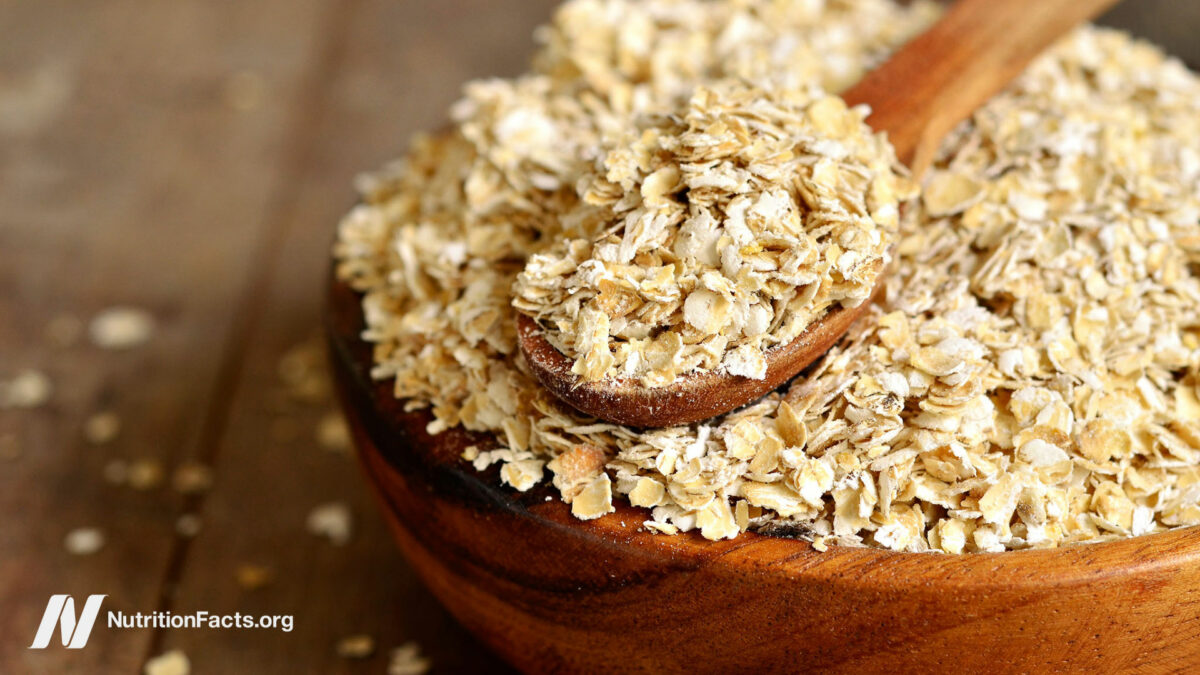
Diabetes
Millan, a member of the NutritionFacts.org community, told me her story recently. When she was 30, she was diagnosed with type 2 diabetes. Having struggled with obesity all her life, she had tried nearly every fad diet but, not surprisingly, would quickly gain back whatever she’d lost. Millan’s parents, brothers, and aunt were all diabetic, so she figured her own diagnosis was inevitable. She thought there was nothing she could do.
Her initial diagnosis was in 1970, and she lived with diabetes for two decades. Then, in the 1990s, she switched to an entirely plant-based diet. Today, her energy levels are better than ever, she looks and feels younger, and she’s finally been able to maintain a healthy weight.
Millan didn’t find some wonder drug or trademarked diet. She simply decided to eat healthier food.
Type 2 diabetes has been referred to as the 21st century’s Black Death in terms of its exponential spread around the world and devastating health impacts. Instead of the bubonic plague, though, its pathological agents may be high-fat and high-calorie diets.
Type 2 diabetes, however, is almost always preventable, often treatable, and sometimes even reversible through diet and lifestyle changes. Like other leading killers—especially heart disease and high blood pressure—type 2 diabetes may be an unfortunate consequence of dietary choices. There is hope, though, even if you already have diabetes. Through lifestyle changes, you may be able to achieve a complete remission of type 2 diabetes, even if you’ve been suffering with the disease for decades.
People who eat a plant-based diet have been found to have just a small fraction of the diabetes rate seen in those who regularly eat meat. As diets become increasingly plant-based, there appears to be a stepwise drop in diabetes rates. Based on a study of 89,000 Californians, flexitarians (who eat meat maybe once weekly rather than daily) appear to cut their rate of diabetes by 28 percent, and those who cut out all meat except fish appear to cut their rates in half. What about those eliminating all meat, including fish? They appear to eliminate 61 percent of their risk. And those who go a step farther and drop eggs and dairy, too? They may drop their diabetes rates 78 percent compared with people who eat meat on a daily basis.
For substantiation of any statements of fact from the peer-reviewed medical literature, please see the associated videos below.
Popular Videos for Diabetes

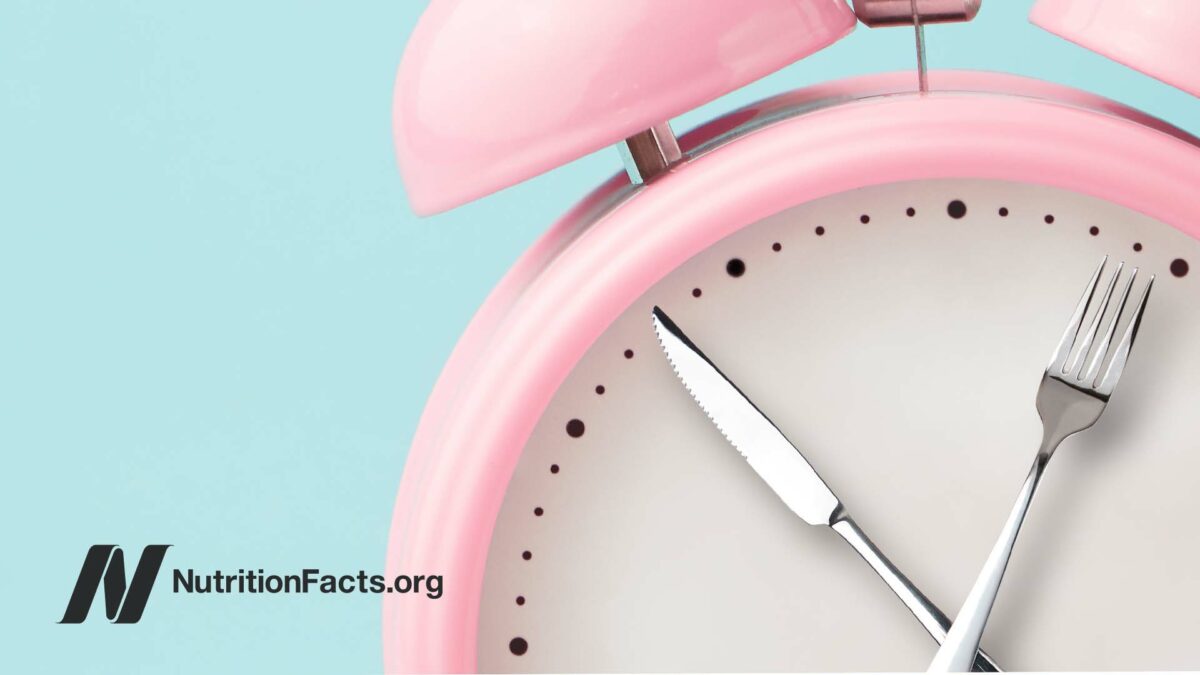
Fasting to Reverse Diabetes
By losing 15 percent of their body weight, nearly 90 percent of those who’ve had...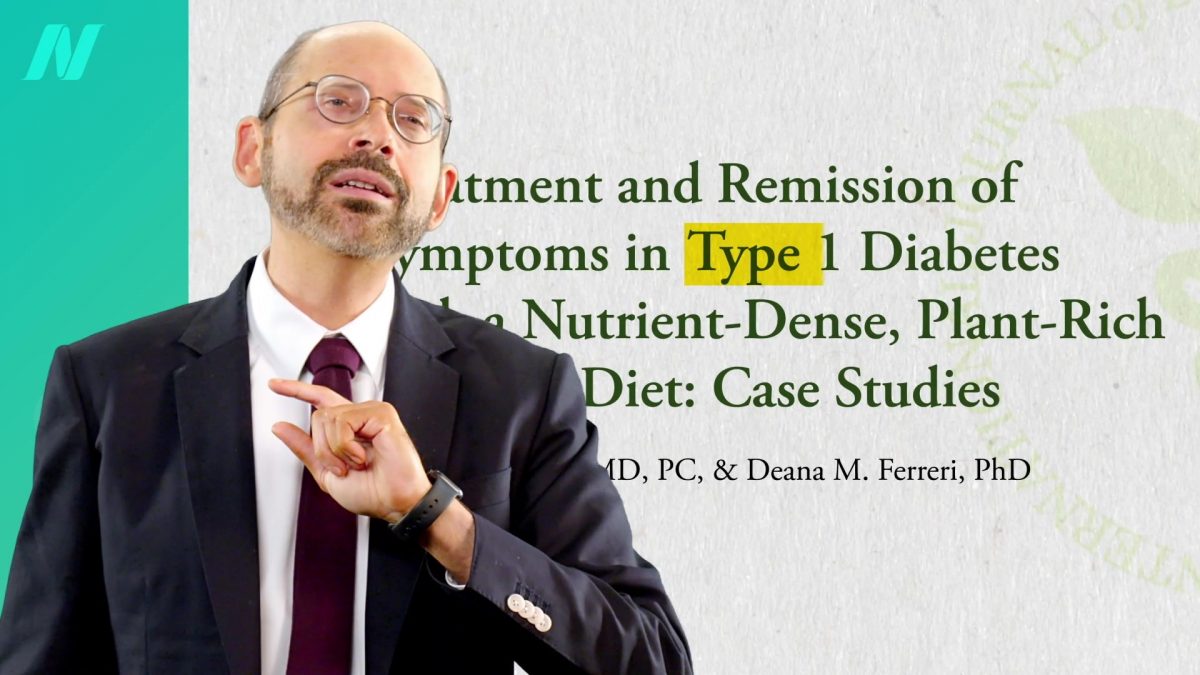
Type 1 Diabetes Treatment: A Plant-Based Diet
Is it possible to reverse type 1 diabetes if caught early enough?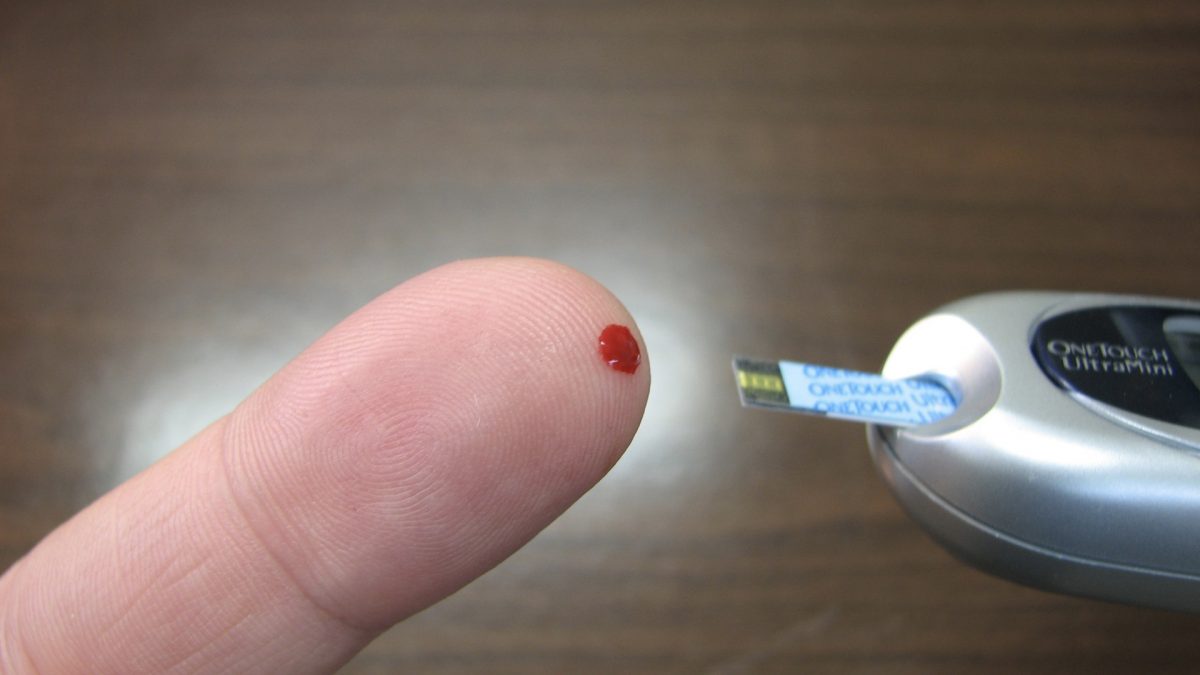
How Circadian Rhythms Affect Blood Sugar Levels
The same meal eaten at the wrong time of day can double blood sugars.
Does a Ketogenic Diet Help Diabetes or Make It Worse?
Keto diets put to the test for diabetes reversal.
The Best Diet for Diabetes
The case for using a plant-based diet to reduce the burden of diabetes has never...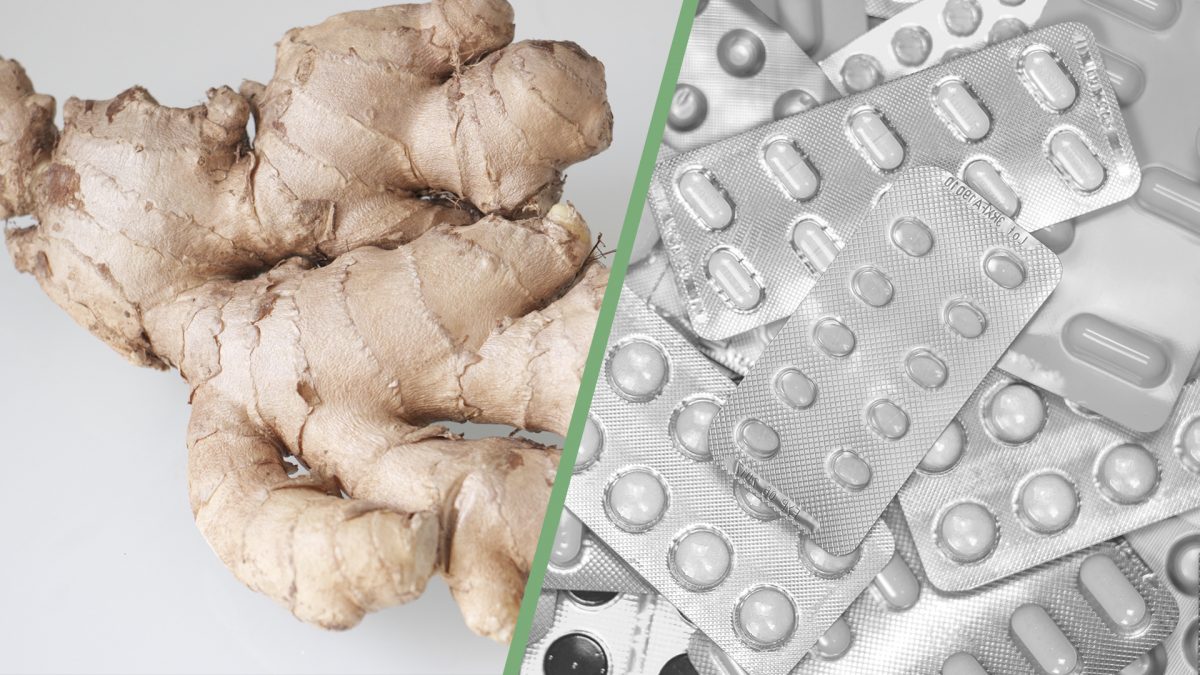
Is Ginger Beneficial in a Diabetic Diet?
Ground ginger and ginger tea are put to the test for blood sugar control.
Benefits of a Macrobiotic Diet for Diabetes
What happens when you add massive amounts of carbs to the daily diet of type...
What Causes Insulin Resistance?
Prediabetes and type 2 diabetes are caused by a drop in insulin sensitivity blamed on...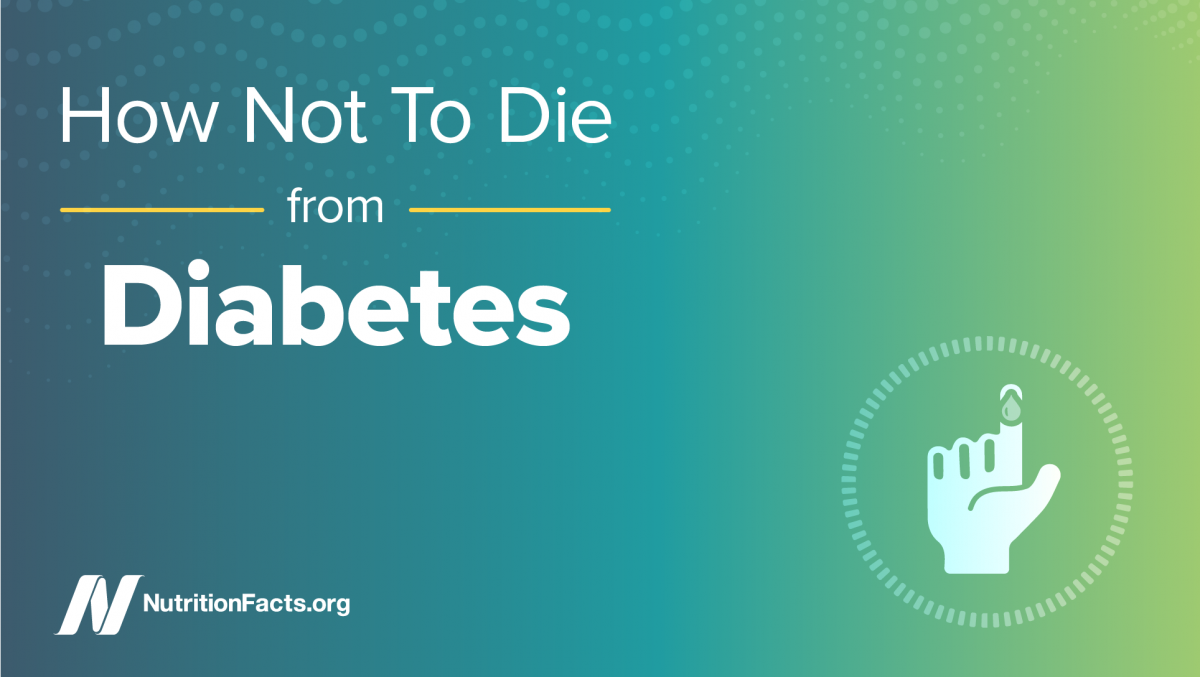
How Not to Die from Diabetes
Type 2 diabetes can be prevented, arrested, and even reversed with a healthy enough diet.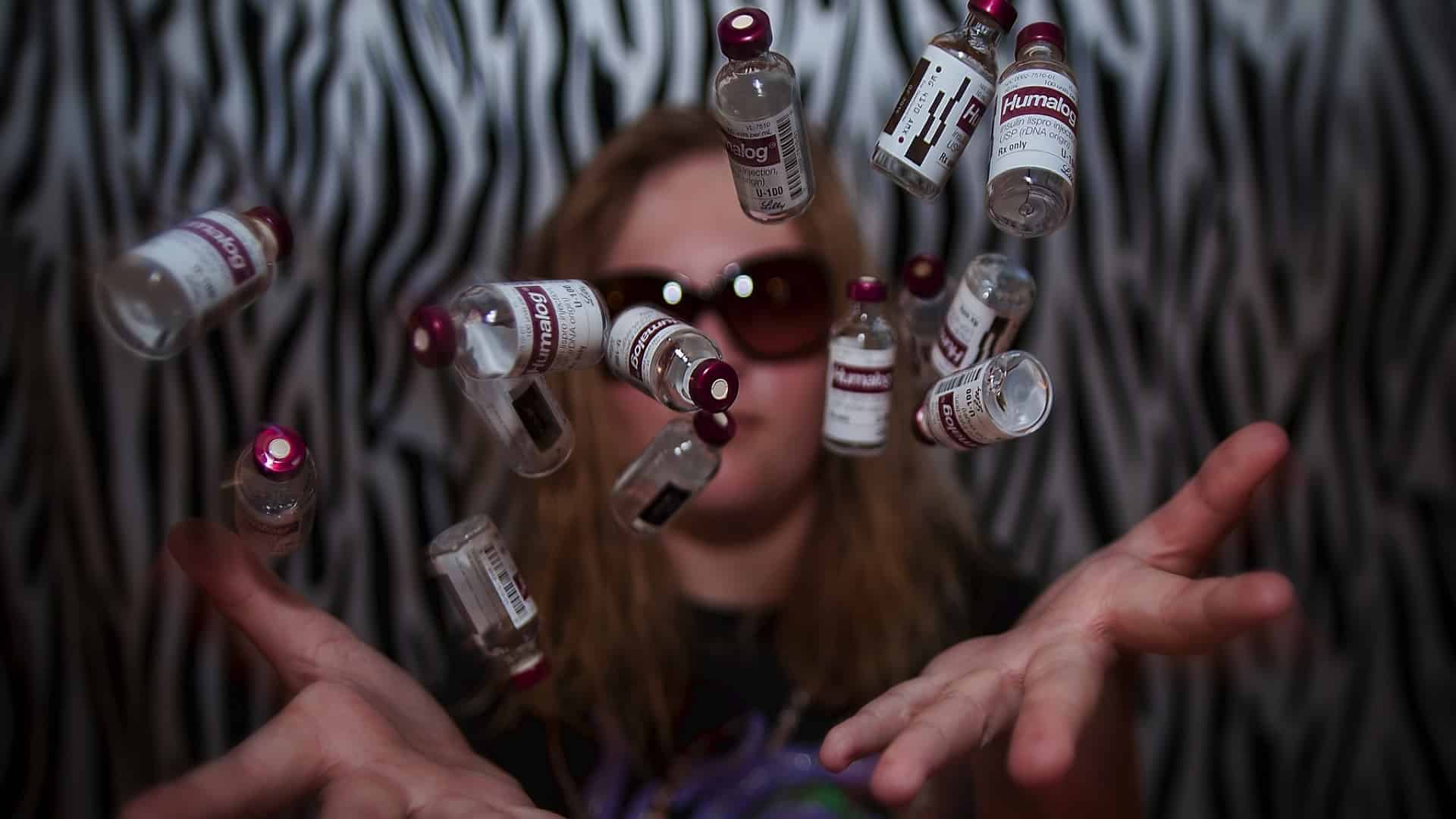
Plant-Based Diets and Diabetes
We’ve known for a half century that plant-based diets are associated with lower diabetes risk,...
Can Diabetic Retinopathy Be Reversed?
The reversal of blindness due to hypertension and diabetes with Dr. Kempner’s rice and fruit...
Diabetes as a Disease of Fat Toxicity
The “twin vicious cycles” explain how the buildup of fat in the cells of our...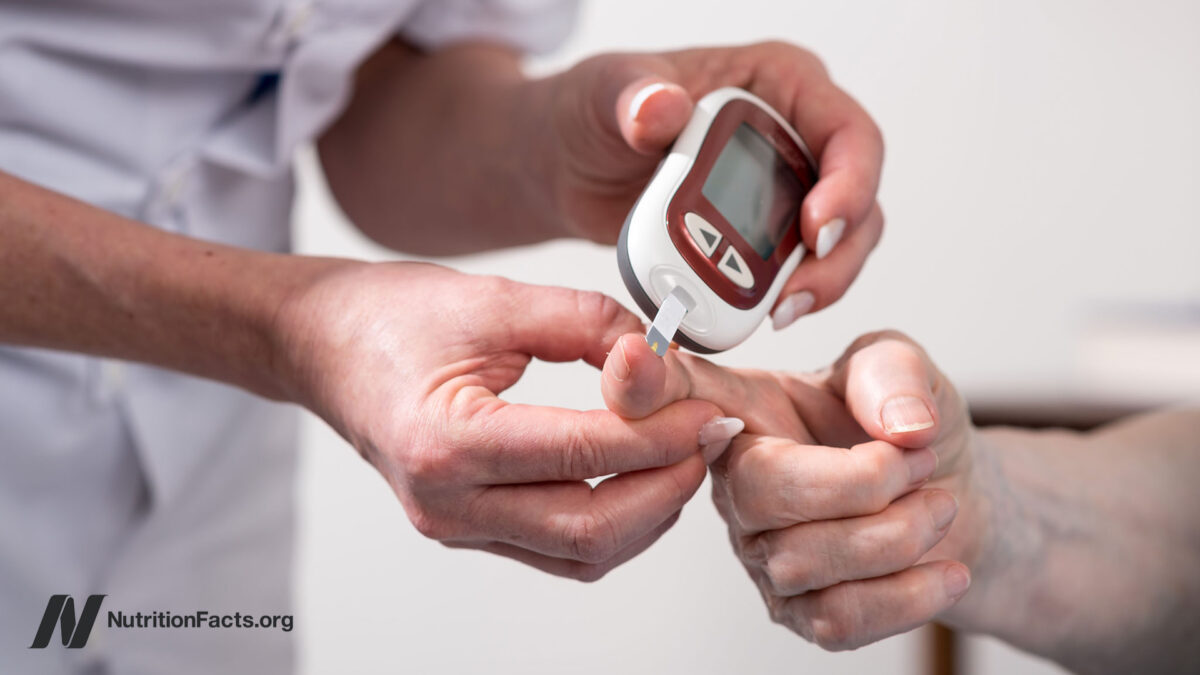
What Causes Diabetes?
Saturated fat can be toxic to the insulin-producing beta cells in the pancreas, explaining why...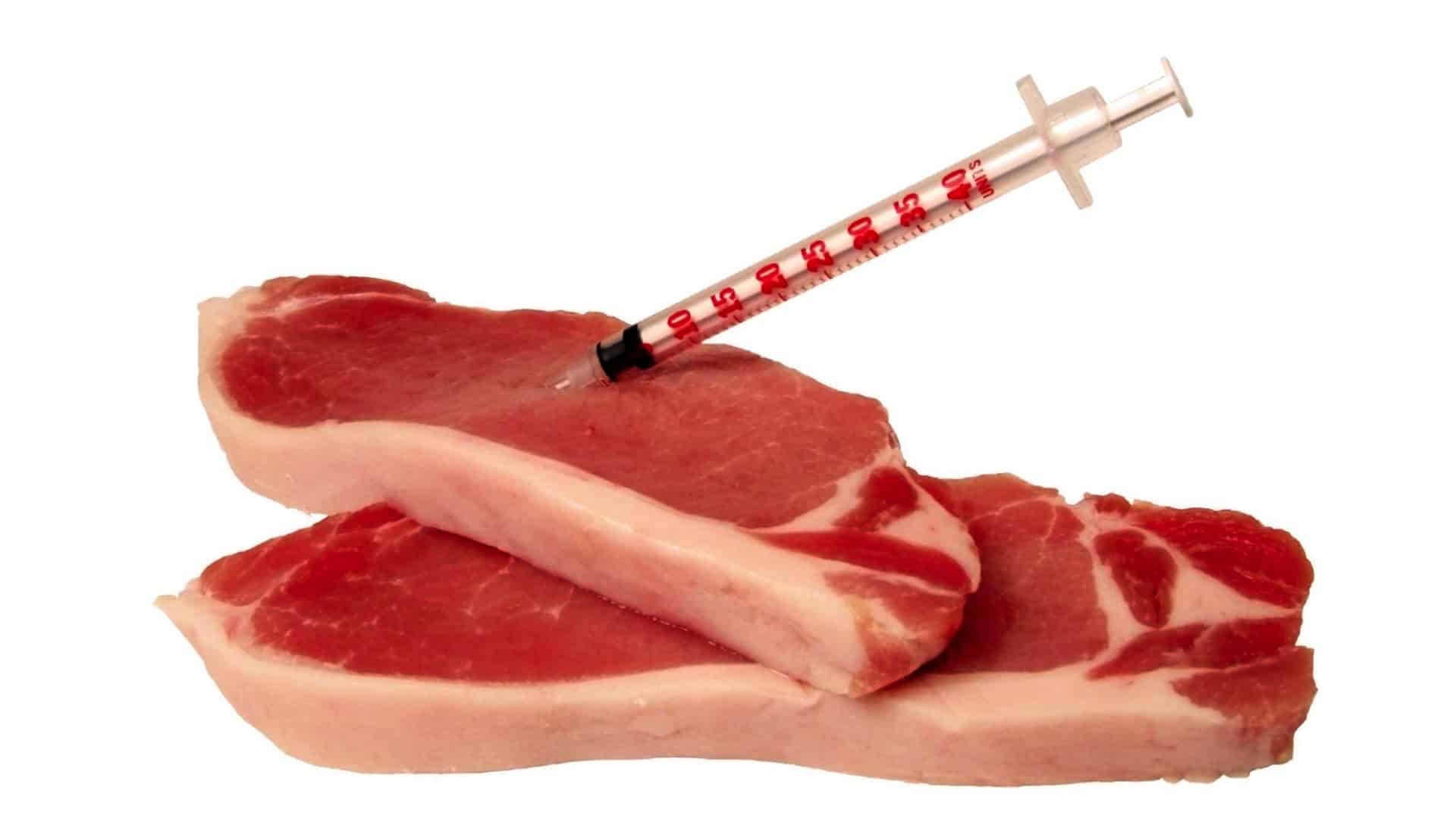
Why Is Meat a Risk Factor for Diabetes?
Potential culprits include the trans fat in meat, the saturated fat, cholesterol, heme iron, advanced...
How May Plants Protect Against Diabetes?
Protective properties of whole plant foods against diabetes include antioxidants, lipotropes, fiber, and the ability...
Plant-Based Diets for Diabetes
When placed head-to-head against the American Diabetes Association diet, how do plant-based diets fare in...
Turmeric Curcumin for Prediabetes
A randomized, double-blinded, placebo-controlled trial on the use of the turmeric pigment curcumin to prevent...
Eggs and Diabetes
Even just a single egg a week may increase the risk of diabetes—the leading cause...
Fish and Diabetes
The relationship between fish consumption and diabetes risk may be due to toxic pollutants that...
Diabetics Should Take Their Pulses
There's a reason that professional diabetes associations recommend bean, chickpea, split pea, and lentil consumption...
How to Prevent Prediabetes from Turning into Diabetes
Approximately 1 in 3 Americans have prediabetes, but only about 1 in 10 knows it....
When Drugs and Diets Don’t Lower Diabetes Deaths
Why do some drug-based strategies shorten the lives of diabetics and some diet-based strategies fail...
Diabetes Reversal: Is It the Calories or the Food?
Even when study subjects were required to eat so much that they didn’t lose any...
Reversing Diabetes with Food
Type 2 diabetes can be reversed with severe calorie restriction—whether by surgery or starvation—but did...
Curing Painful Diabetic Neuropathy
Diabetics suffering from nerve pain for years are cured within days with a plant-based diet.
Can Vinegar Help with Blood Sugar Control?
Before drugs came along, the consumption of vinegar with meals was used as a folk...All Videos for Diabetes
-

Eliminating Heart Disease, the Number One Cause of Death
What is the leading cause of heart disease, our leading cause of death?
-

Obesity: Is a GLP-1 Deficiency Its Cause, and How to Treat It Without Ozempic and Other Drugs
What is a safer and cheaper way to lose weight than GLP-1 drugs?
-

Using Prebiotics, Intact Grains, Thylakoids, and Greens to Boost Our GLP-1 for Weight Loss
Boost our natural satiety hormone GLP-1 through out diet.
-

A Plant-Based Diet for Weight Loss: Boosting GLP-1 and Restoring Our Natural Satiety Circuit
Why does our natural GLP-1 satiety mechanism fail, and what can we do about it?
-

Comparing the Benefits and Side Effects of Ozempic (Semaglutide)
Obesity can be so devastating to our health that the downsides of any effective drug would have to be significant to outweigh its weight-loss benefits.
-

Is Ozempic (Semaglutide) Safe? Does It Increase Cancer Risk?
How common are serious potential side effects of GLP-1 weight-loss drugs, such as suicide, pancreatitis, bowel obstruction, thyroid cancer, and pancreatic cancer?
-

GLP-1 Weight-Loss Drugs Like Ozempic (Semaglutide): How Do They Work? Are They Effective?
What is the hormone GLP-1, what separates GLP-1 mimics from previous weight-loss drugs, and how much weight may be lost before weight loss plateaus?
-

The TAME Trial: Targeting Aging with Metformin
If you have diabetes, metformin can make things better, but if you don’t, the drug may make things worse.
-

Side Effects of Metformin as a Life-Extension Drug
As a mild mitochondrial poison, metformin carries a variety of downsides.
-

Does Metformin Work as a Life-Extension Drug?
Amazingly, diabetics placed on metformin may live longer lives than those who never got diabetes in the first place.
-

Naturally Boosting AMPK with Exercise for Life Extension
AMPK is said to serve as a “mitochondrial guardian.”
-

Side Effects of Resveratrol Supplements
Resveratrol supplements may blunt some of the positive effects of exercise training.
-

Does Resveratrol Benefit Our Metabolic Health?
Which conditions have resveratrol supplements been shown to help?
-

The Side Effects of Human Growth Hormone as an Anti-Aging Therapy
Taking human growth hormone (somatotropin) may actually accelerate the aging process.
-

Do Vitamin D Supplements Help Prevent Diabetes, Cancer Mortality, and Overall Mortality?
Randomized interventional trials are necessary to establish cause-and-effect.
-

The Supplement Shown to Slow Age-Related Hearing Loss
Some studies found that higher levels of folate in the blood seem to correlate with better hearing, so researchers decided to put it to the test.
-

Update on Vegetarian Stroke Risk
Those eating more plant-based diets have lower risk of having a stroke, including both bleeding and clotting strokes.
-

The Best Diet for COVID and Long-COVID
Healthy plant-based diets appear to help reduce the risk of severe COVID-19 and getting infected in the first place, even independent of comorbidities.
-

Yoga Put to the Test for Headaches, Diabetes, Osteoarthritis, and the Elderly
What happens when real yoga is compared to sham yoga?
-

Greens, Green Tea, and Nuts Put to the Test for Telomeres
Not all plant foods are linked to less cellular aging based on telomere attrition, and not all animal foods are linked to more.
-

Better to Exercise Before or After Meals for Weight Loss and Blood Sugar Control?
If people burn more fat on the days they exercise before eating, rather than afterwards, why doesn’t this translate into more weight loss?
-

Improving VO2 Max: A Look at Vegetarian and Vegan Athletes
Plant-based diets improve the performance of athletes and nonathletes alike.
-

The Negative Effects and Benefits of Plant-Based Diets
What are the pros and cons of plant-based eating?
-

Is Six Hours of Sleep Enough?
Just because we don’t have evidence that there is a growing epidemic of sleep deprivation doesn’t necessarily mean we are getting enough sleep.
-

Strategies to Eat Less Meat
What is the most effective way to help people reduce their meat consumption?
-

Plant-Based Diet for Treating and Reversing Stage 3 Kidney Disease
I share a touching story of the power of plant-based eating for chronic kidney failure.
-

Update on Erythritol Sweetener Safety: Are There Side Effects?
Why are erythritol levels in the blood associated with higher levels of chronic disease?
-

How Much Erythritol Sweetener Is Too Much?
What are the maximum acute and daily doses for adults and children to avoid gastrointestinal effects?
-

Soul Food That’s Good for the Soul
The best of soul food’s origins are tied to the plant-centric West African diet.
-

Oatmeal Diet Put to the Test for Diabetes Treatment
What are the extraordinary, lasting benefits we may get from a few days of an oatmeal diet?
-

How Does Oatmeal Help with Blood Sugars?
The prebiotic fiber in oats helps to explain why oatmeal can improve diabetic control.
-

Is Oatmeal Good for People with Diabetes?
Before there was insulin, there was the “oatmeal cure.”
-

Does Coffee Inhibit Iron Absorption? What Are the Effects of Having Too Much Iron?
Coffee and common herbal teas impair iron absorption, which may help explain some of their benefits.
-

The Role of Endotoxins in Alzheimer’s and Dementia
Why can a single meal high in saturated fat impair cognition?
-

Vinegar for Blood Sugar Control and Polycystic Ovary Syndrome (PCOS) Treatment
Apple cider vinegar may help with ovulatory function in those with PCOS.
-

The Best Diet for Fibromyalgia and Other Chronic Pain Relief
Anti-inflammatory diets can be effective in alleviating chronic pain syndromes.
-

The Harms Associated with Eating More Southern-Style Food
Diet appears to mediate the majority of the racial health gap.
-

Answering Your Questions About Cholesterol and Diabetes
I answer some common questions I’ve been asked about cholesterol and diabetes, such as “What is the ideal LDL?” “What’s going on when someone eats healthfully but their glucose is still out of control?”
-

Antibiotic-Resistant E. coli and UTIs in Vegetarians vs. Meat-Eaters
Tainted chicken may result in more than a million urinary tract infections in American women every year.
-

Lower Protein Diet Proven to Help Kidney Disease
How might we cut the risk of dialysis and death in half?
